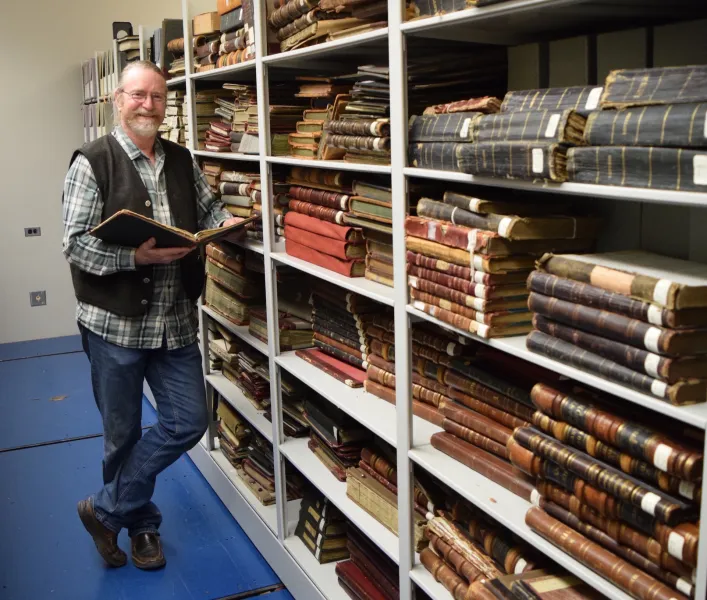Marcus Robyns began his collegiate studies as a secondary education social studies major at the University of Oregon, yet he felt a personal sense of dissonance while pursuing that field. While organizing an undergraduate history club, he discovered there was a university archive and arranged a tour. When the archivist showed him a menagerie of old artifacts representative of the school's history, he said, “You work with all this stuff? Are there jobs in this field?”
From that moment onward, Robyns' academic pursuit shifted. He launched a lifelong career that led him to Northern Michigan University, where he has served 25 years (and counting) as director of the Central U.P. and NMU Archives.
The Eugene, Ore., native earned both a bachelor's and master's degree in U.S. history from the University of Oregon with a concentration in archival management. He began his post-graduate career in 1990 by working as an archivist for two years at Tyrrell Historical Library in Beaumont, Texas. While Robyns joked that he'll “go anywhere but south,” he returned to his home state thereafter to serve an archivist role for the City of Portland.
“It was a good archival position, but government bureaucracy work was not what I wanted to do,” said Robyns. “I wanted to work more with historical regional collections and with personal papers.”
Toying with the idea of leaving that position, Robyns saw an archival job posting at NMU: “It crossed my mind that I knew of the Upper Peninsula vaguely. I had remembered reading about a place that was thinking of seceding from the rest of Michigan. This was a legit movement in the ‘70s.”
Early on during his time at NMU, Robyns had a realization: “I remember sitting in my office and feeling overwhelmed. At that time, the tunnel on campus connecting West Science and Harden Hall was used more heavily. I remember watching students go back and forth from my office, and it hit me like a ton of bricks: Here are these young, bright and responsible young people who want an opportunity. Let's utilize that. So we hired a group of student employees.
“We treat student assistants in a very professional manner, and I try to do as much training as I can. Students actually work with collections, patrons and more. They are very involved and have professional titles, which they can put on their curriculum vitae.”
With a smile on his face, Robyns recounted many fond memories of working with student assistants throughout the past years. Photographs of the students and other archives staff and volunteers line a wall in the department's office as a tribute to them and the work they have put forth. Robyns said that many students who work there “go on to do great things.”
To name a few, Patrice Davis ('03 BS), one of the first student employees, became senior archivist of the Department of Justice in Washington, D.C. History major Emily Tinder, who now works in the office, is planning to become an archivist as well. Robyns noted that Tinder's “attention to professional detail and her abilities are remarkable.” There is no doubt that his appreciation for student employees is limitless.
Robyns' work entails collecting archives for NMU's collection. He invests most of his time working in the region identifying and collecting historical manuscript materials, personal family papers, government records and other primary sources that document U.P. history. He also serves as a professor at the university.
“I have had the chance to work with incredible students here, and to do the type of work that I've always wanted to do. It is gratifying near the end of my career to say that I've made a difference in the world. Not everyone gets to say that. In my case, I have helped to preserve and document the history of this region.”
As he approaches retirement, Robyns' career will crescendo with a bang, as he recently won a $100,000 federal grant to help create UPLINK. The digital network will allow 33 U.P. heritage groups to collaboratively preserve and expand access to their collections for audiences worldwide.
“My goal is to create enough material for real substantive scholarship to take place with the material online. The goal is within two years to have a fairly robust portal that will provide access to collection-level information about what these different U.P. organizations have.”
When out of the office, Robyns resides in a ranch-style cabin in Gwinn with his wife Tammy and family. They are surrounded by a greenhouse, horses, chickens and soon sheep and pigs as well. The way he speaks with pride about each family member makes it clear that his love for them is immense.
As a “fanatical baseball fan,” Robyns said he dreams of merging his interests by conducting historical baseball research, including a region-specific focus on whether area mines had baseball teams in the past.
This feature was prepared by former student writer Jill Vermeulen.

